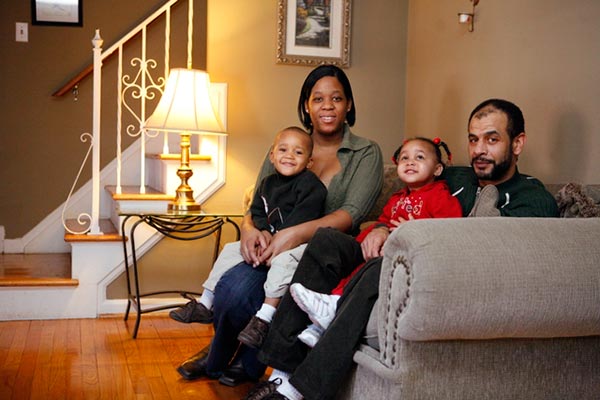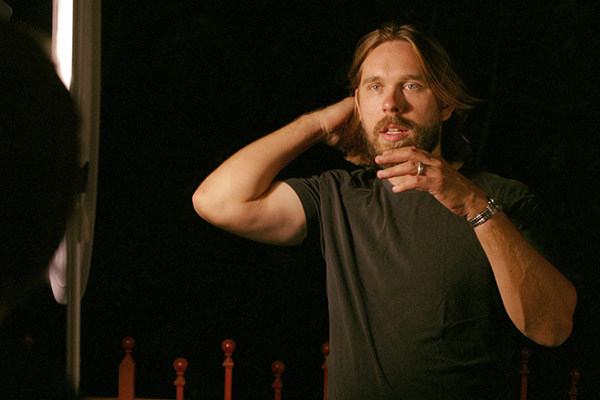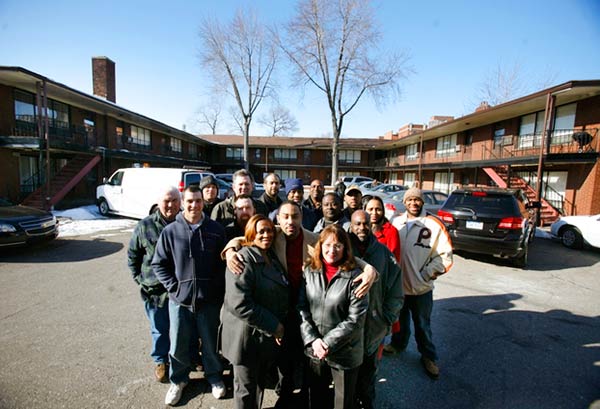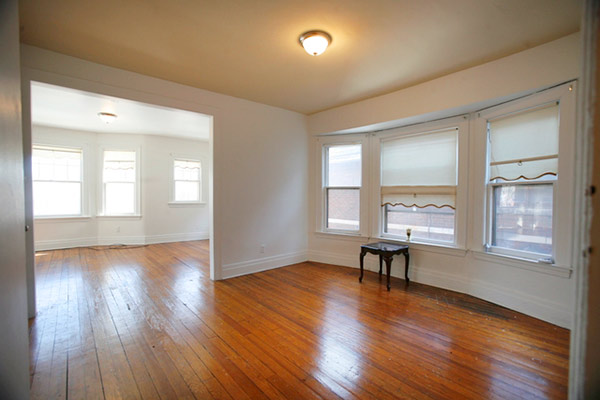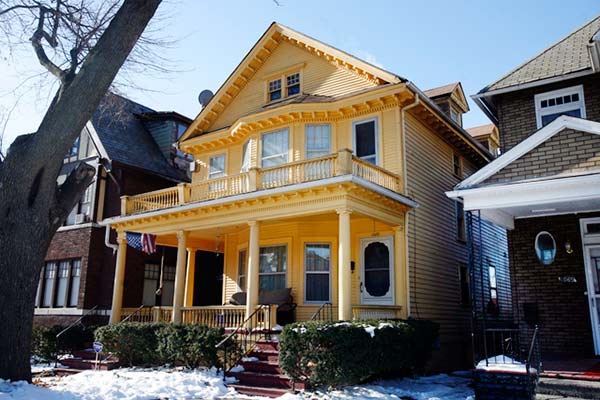L.A. investor aims to put families in Detroit homes and money in the bank
Robin Scovill lives in L.A. He’s not a Detroiter, but when he started investing in the city, he got a little Detroit in his veins. He’s now out to make profits, yes, but he wants to build a better Detroit while he’s at it.
Robin Scovill is freezing. He’s not used to the cold. He’s from Los Angeles, where it is at least a 35 degrees warmer than in Detroit.
It’s early on a Saturday morning, and Scovill has assembled his “team” of Detroiters. On this particular day, he has a project manager, property manager, contractor, maintenance man, and Realtor on site. They are in a parking lot at Van Dyke and Parker in the West Village discussing a U-shaped 26-unit apartment building Scovill is looking to purchase. It’s two stories, running at 65 percent occupancy right now. Scovill calls it “Big Van Dyke.” The tenants’ heating bills are outrageous. The windows appear thin. Dormant air conditioners droop and sag from the brick. The second floor balcony dips. There’s been obvious neglect. “Big Van Dyke” isn’t pretty. It needs work.
“We’ll need to turn management around, bring up occupancy, and figure out how to keep the place heated,” he says, rubbing his own hands together for warmth. “We need to keep the families warm.” Heat seems like a no-brainer, right? But at “Big Van Dyke” it doesn’t seem to be the case. That’s where Scovill comes in. As he explains it, Paradise Valley, the Detroit investing company he started, focuses on the no-brainers.
“We’re not enticing suburbanites to move into lofts. That’s not what we’re about,” he says. That this is important for the city, but Scovill takes a different approach. Paradise Valley focuses on single-family houses. “We’re putting families in homes in Detroit, and we want to do more.”
Building credibility
Scovill’s Paradise Valley — which takes its name from the famed Detroit neighborhood on the Near Eastside that was cut up, divided, and destroyed by the highways — holds 15 properties in the city, with 46 units, a bulk of them in East English Village. He’s provided homes for 96 people. Five properties are deemed Section 8. Scovill’s plan is to triple Paradise Valley’s holdings in 18 months. It sounds ambitious, and, to some, it might also sound opportunistic.
Scovill lives out of state, but he doesn’t sit on houses. He fills them. “There’s no profit right now, only credibility,” he says. “We’re all able to live but, we’re making more in credibility than money at this point.” The key to Paradise Valley, he says, is velocity and building this credibility.
They purchase houses, fix them up, and aim to rent six weeks later. If they wait, he says, money is lost and, more importantly for Detroit, a home sits vacant. “We want to fill our properties with tenants as soon as possible,” he says. “We make them safe, clean, and functional. Beautiful isn’t there. If we focus on that we waste time.” Plus, he says, “beautiful” costs about 20 or 30 grand.
Even though they aren’t luxury with granite counter tops and crystal chandeliers, the homes are hardly rundown. He has purchased foreclosures for as little as $3,500, but they are quality and sometimes immediately rentable houses. They may need a paint job and, maybe, a few thousand in fixer-upper cash, but they definitely aren’t dusty, mildewed houses.
Gordon Hawkins, one of Scovill’s main Realtors, has been buying and selling in Detroit for seven years. He lives in West Village. Hawkins says he gets lots of calls from out of state investors, and he doesn’t mind working with them. “The dollars they spend here are going back into the community.”
“As more and more money pours into these houses in these neighborhoods to stabilize the city, the better Detroit will be,” Hawkins says. “There will come a time when (Detroiters) don’t need that out of state investor, when people should start owning their own homes and not renting. But right now this is an opportunity to keep the market stable.”
Scovill isn’t an activist — he’s an investor. Paradise Valley wants to be profitable. And Hawkins and the other realtors working for Scovill are looking to make money, as well. But Detroit seems to pull something out of these people that transcends profits. And as Scovill tells it, there’s something here that turned him from merely an opportunist to an opportunist with a conscience. “Detroit teaches you what’s up,” he says. “Detroit drives me. This can be the most desirable place in the United States for the right people.”
Know the city
Yet, when Scovill — a trained filmmaker and not a lifelong investor — first arrived in Detroit, he wasn’t so sure. He had heard about the foreclosure problem here. He was looking to invest in something. He looked at a few markets across the U.S. but landed on Detroit, mainly because he had a friend in Westland and a couch to flop on. “I looked at zip codes, I went block by block, I color coded the blocks,” he says. He used green, yellow, and red to mark the streets. Green blocks were family oriented, yellow blocks designated caution (maybe a few burnouts, vacancies, etc.), and red meant keep going, don’t stop.
“There’s a right way to (invest in Detroit) and there’s a wrong way,” says Ryan Cooley of Detroit’s O’Connor Real Estate and Development. “If you aren’t informed you can’t do it right. You need to be here, see Detroit. If you don’t spend enough time or any time in Detroit, if you don’t know the neighborhoods, you’re doing it wrong.”
Cooley says Scovill faltered in the beginning but found his way through. “Robin really believes in the city,” Cooley says. “That’s the right way.”
“You have to do your homework, you have to know the neighborhoods. You have to have the right attitude to do it the right way,” Scovill says. “This is true investing in my mind. We’re not just investing money, we’re investing in housing, in the neighborhood, in the city. We can’t just look at the bottom line of the dollar.”
To date, Scovill has invested $800,000 into his Detroit holdings. Last summer Scovill’s team put together a proposal for some of HUD’s Neighborhood Stabilization Program funding. It was 80 pages and incorporated things like a 2-acre farm, 46 rehabs, 32 new constructions, and 406 parks. The proposal outlined their vision for Detroit and detailed how the NSP cash could help. They were granted $2 million, and given $500,000 to start. Scovill said, “Why don’t you give us $300,000 to start?”
Scovill is still deciding whether or not Paradise Valley will use the NSP money. He hasn’t accepted it just yet. He says the process when using the state’s money is much more involved and would slow down Paradise Valley’s velocity. But it’s a glimpse into the scope of Scovill’s Detroit plans. It’s not just bricks, a basement and a profit; it’s curtains in the window, families in the house, and toys in the yard.
Kicking the tires
On this particular Saturday, Scovill was making a few rounds and checking out a few properties, kicking tires a bit. There are a few houses in East English Village he’s looking at, possible NSP funding purchases.
One house near Outer Drive is painted a forest green over the brick. It has an odd extension in the back. The wooden fence is warped, the carpeting needs to come up, the basement has an old piano missing a few keys. “The color of this house is ugly,” says Evelyn Harris, his property manager, talking about the outside paint job.
Scovill notices a neighbor across the street. He jets over there. After 15 minutes, he returns. “There’s a restaurant owner over there, a lawyer there, this lady leaves for six months to go to Florida every year,” he says. “He talks to everybody,” Harris says. “You have to know the neighborhood,” Scovill says.
He’s still freezing. “I’m not trying to be a Detroiter, cause I’m not,” he says, now back in the car. “But I (expletive that rhymes with trucking) love Detroit.”
Terry Parris Jr. writes for Model D. Send feedback here.
